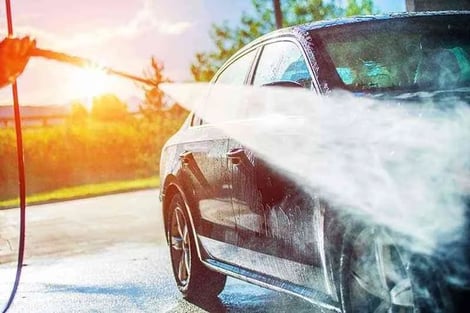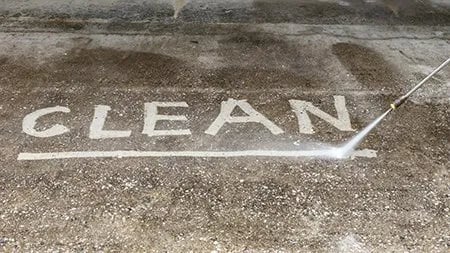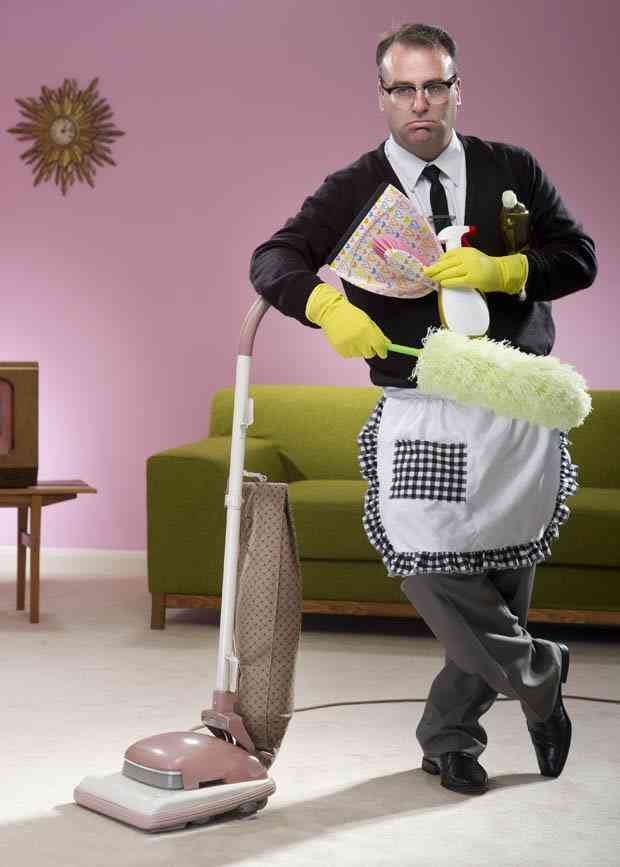Washing Down Plant And Equipment
The pressure of cleaning is twofold, the pressure you get from the other half to pick up your stuff/to tidy up after yourself/to help out with the cleaning once in a while and secondly the pressure we’ll come on to with regards to today’s Toolbox Talk. Cleaning the house has never been an undertaking that interests the male population of the world. Donning the yellow marigolds, prancing around with a feather duster or head down the loo with a scourer is not something any man I know will willingly do and to be honest not a joy for many women either! Now we move on to the kind of pressure we like; put a pressure washer in the hand of a man and cleaning becomes a pleasure; I mean it’s a gadget that does the hard work for you, a dream for a guy and at the end of it you have a shiny car, sparkling patio or gleaming BBQ grill (ready to do the really manly job of head chef at the BBQ on your shiny pressure-washed patio!) This week’s Toolbox Talk is all about washing down equipment whether it be on site or in your own workshop.
Construction work can create a lot of contaminated water whether it be from excavations in which rainwater/groundwater can build up and mix with silt; this will then create a mud that can be washed into watercourses and harm humans and animals. The use of Bentonite which swells and gels when mixed with water also becomes incredibly polluting if entering a watercourse. Water from washing down plant and machinery can contain contaminants such as silt and bentonite mentioned above as well as oils and greases.

As delightful as standing on a sunny Sunday afternoon transforming your car from ‘clean-me-etched-in-the-dust state to just-driven-out-the-showroom shine, washing down equipment using pressure jets can we very dangerous and in fact causes fatalities every single year. One of the main dangers links to the fact that the jets require electricity to work and as we all know electricity and water do not mix! Pressure washing creates wet areas as well as covering the user in spray which can make you susceptible to an electrical shock if you are working with a faulty machine or if you spray into equipment that is still connected to electrical supply. If you use a washer with flexible cable, they can be dangerous since they cross colleagues’ walkways, can get pulled or run over. The flexible cable as well as connection to the plug is generally the part of an electrical machine that fails. The safest way to use a pressure washer is to use a fixed in place version with permanent wiring or if this is not possible fit an RCD or earth monitoring device to cleaners with flexible cables. Always check cables and sockets for signs of damage and ensure visual checks happen on a weekly basis (if your washer is being used daily). Earthing and insulation of the cleaner should be checked every 3 months (more on construction sites) and ideally a written log should be kept to inform you of when the next maintenance is due and highlight any faults.

There are other non-electrical risks associated with using high pressure jets. We expect the machines to slice through stubborn dirt (sounds like a cleaning ad) but with speeds of around 3,300km per hour the pressure jets can literally slice through skin too. It becomes particularly dangerous if mixed with unknown sharp debris; this is where fatalities can occur so where possible remove heavy deposits from machines first. No one should ever stand in front of a cleaning jet and you should never directly spray a person. Have a designated separate area with good ventilation for your jet washer and keep the area clear of clutter to ensure you have secure footing/positioning when using the machine to limit any instances of loosing control. Always wear the correct PPE (eye protection, gloves, RPE, slip-resistant boots which CES Hire stock, take a look at our range here) and be aware of those around you as pressure washing creates mists that can contain harmful substances such as mud residues, oil and cleaning agents which can cause skin irritation, dermatitis and asthma. If you are using any cleaning agents ensure they are diluted to the correct levels. Once you have finished cleaning dispose of waste correctly making sure it does not run into drains, gullies or watercourses. It is important to wash yourself thoroughly after washing down plant and equipment (look back at our blog about safely working with materials such as cement and plaster for tips on personal washing to prevent skin irritation).
Next time you get out the pressure washer for domestic use to spruce up the garden for Spring or to wash down plant and equipment at work be aware of the dangers associated with working with water and electricity as well as the knife-like power of the 3,000+ km per hour water jets!

